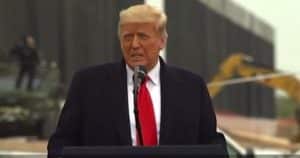President Biden Vetoes Bill to Expand U.S. Judiciary, Leading Ally Expresses Disappointment
President Joe Biden's veto of a bipartisan bill designed to increase the number of U.S. federal judges has led to vocal disappointment from one of his major allies, Senator Chris Coons.
This veto is seen as a significant setback for efforts aimed at easing the burden on the nation’s overtaxed judicial system.
The legislation, officially known as the JUDGES Act, was introduced with cooperative efforts from both Democratic and Republican senators. It proposed the addition of 66 federal district judges over a period extending beyond a decade, targeting a reduction in case backlogs and enhancing the efficiency of the judiciary.
Sen. Coons, a Democrat from Delaware and a former campaign co-chair for Biden, alongside Sen. Todd Young, a Republican from Indiana, spearheaded this initiative. Their goal was to depoliticize the approval process of judicial nominations regardless of which party controlled the White House.
Federal Bill Aims to Alleviate Strain on Judiciary
Passage of the bill through the Senate occurred unanimously in August, indicating strong bipartisan support and recognition of the pressing need to address judicial inefficiencies. However, its journey was stalled in the House of Representatives, where action was delayed until after the November 2024 elections, resulting in a shift in political dynamics.
With the Republican party taking control of the House, the passage of the bill was strategically postponed. This maneuver was reportedly influenced by the outcome of the presidential election, where Donald Trump was elected president, shifting the potential future appointments to the judiciary.
Amidst these developments, President Biden issued a threat to veto the bill just two days before its final consideration in the House, a move that was soon actualized and led to significant controversy.
Political Dynamics Influence Judicial Bill's Fate
Sen. Coons expressed his disappointment and frustration regarding the veto, emphasizing the arduous, multi-year effort and the bipartisan nature of the bill. "I am disappointed by this outcome, for my own state and for the federal judges throughout the country struggling under the burden of ever-higher caseloads," Coons remarked. He lamented the lost opportunity to implement what he described as a crucial legislative measure, crafted to function irrespective of electoral results.
Further complicating the narrative, Democratic support for the bill, initially strong, waned as the political landscape shifted with Trump’s impending presidency. Accusations of partisan agendas surfaced, influencing the administration's stance on the bill. Speaker Mike Johnson, a Republican from Louisiana, criticized this shift, highlighting how previous Democratic support was contingent on the expectation of a win by Vice President Kamala Harris in the presidential race.
"This important legislation garnered broad, bipartisan support when it unanimously passed the Senate in August because it directly addresses the pressing need to reduce case backlogs in our federal courts and strengthen the efficiency of our judicial system," Johnson stated. He accused the Democrats of reversing their stance due to partisan influences, obstructing what he regarded as a crucial legislative step towards judicial reform.
Impact of Partisan Politics on Judicial Reform
As the political tug-of-war continues, the implications of the veto are far-reaching, affecting not only the immediate legislative landscape but also the broader efficiency and capability of the federal judiciary.
The stalemate illustrates the intricate interplay of legislative action, executive authority, and partisan agendas.
Sen. Coons, despite his disappointment, vowed to continue advocating for judicial reform, emphasizing the nonpartisan nature intended for the JUDGES Act. "Senator Young and I took pains to make this a nonpartisan process," Coons explained. He stressed the foundational goal of the legislation: to fortify the judiciary against inefficiencies and caseload challenges without being swayed by political changes.




